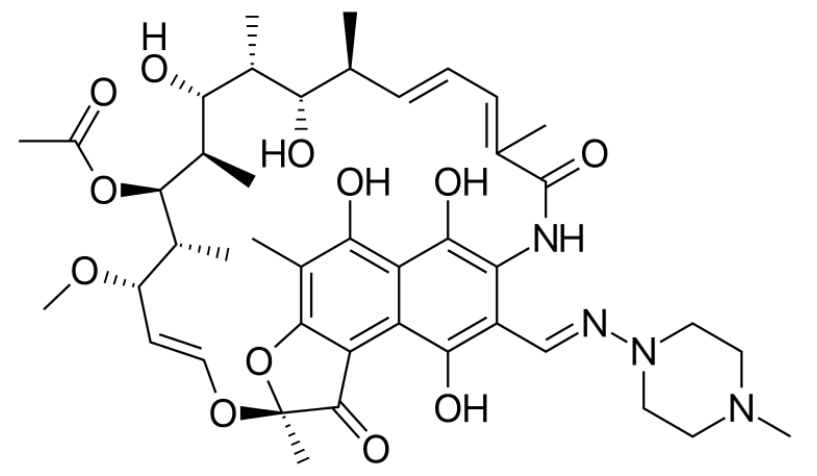Playlist
Show Playlist
Hide Playlist
New Agents to Treat Tuberculosis – Antimycobacterial Agents
-
Slides New Agents to Treat Tuberculosis Antimycobacterial Agents.pdf
-
Reference List Pharmacology.pdf
-
Download Lecture Overview
00:01 There are some new agents in TB which is probably the first that we've had in the last 20 - 25 years so it’s kind of exciting. 00:09 I don’t know how much of this is gonna be on your exams. 00:12 These are relatively new agents. I don’t - I haven’t seen them in the past because they are so new. We’ll have to see what happens in the future. 00:20 The first of these two new agents is bedaquiline. 00:23 Now, bedaquiline is used in drug-resistant TB infections, it’s often used in organisms that are resistant to both isoniazid and rifampin. 00:33 Now what it does or how it works is it blocks intracellular ATP synthase. 00:39 Now, because of that, the bacteria can’t produce any energy. 00:43 ATP is the basis of all energy in the cell, if you can't produce the ATP you can't transmit energy from one cell region to the next and therefore the cell doesn’t survive. 00:55 It’s used in combination with other anti-TB drugs as in are all of them. 00:59 First new TB drug in about 40 years but that comes with a price and the price is about $30,000 a year or about €20,000 a year so it’s out of the reach for many, many, of our patients. 01:14 It should not be used in latent TB infections. 01:18 It is a drug that we should not be used in drug-sensitive TB - there are agents that we can use. 01:26 It should not be used in extrapulmonary tuberculosis and it should not be used in any kind of an infection caused by a non-tuberculosis mycobacteria so in other words if you have a patient who have mycobacterium avium, this is not the drug - use other agents. 01:45 What - the side effects of this drug are plenty. 01:48 We know that there is headache, we know that patients will complain of dizziness, we know patients will complain of some joint pain, and we know patients have elevated liver enzymes. 01:58 A small percentage of patients have elevated liver enzymes but it is significant about 2% - 10%. 02:04 QT prolongation is a concern as well. 02:07 We don’t know how much of a QT prolongation we're going to see so we don’t know if it’s one of the bad drugs or if it’s one of the relatively benign drugs but be aware that QT prolongation can occur and you can have more dysrhythmia. 02:21 Of particularly concern though is that this drug is rarely given by itself so if you're giving this drug with other drugs that prolong the QT interval that is something that you have to be aware of. On its own it’s probably not so bad. 02:35 The next drug that we wanna talk about is delamanid. 02:38 Now, delamanid is an oral medication, it’s used in multi-drug resistant tuberculosis and it also is a cell wall inhibitor. 02:46 Now it works on a slightly different area in the cell wall, it only works against mycobacteria so it is a mycobacteria specific agent, 99% protein-bound by albumin. 02:59 If you think back to our pharmacology, pharmacokinetics lectures, that makes for a real headache when it comes to calculating the proper dose and the volume of distribution. 03:09 It becomes even more problematic when the patients are hypoalbuminemic. 03:13 If they have a low albumin they're gonna be more prone to high drug levels, they're gonna be more prone to side effects and especially when the albumin level is less than 2.8, they're particularly prone to having really high serum concentration levels, something that you wouldn't have expected had they had a normal albumin level. 03:32 It is partly metabolized by cytochrome 3a4, so beware of drug interactions particularly rifampin. 03:40 QT prolongation is also a problem with this drug. 03:44 QT prolongation progresses over 6-10 weeks and then it stabilizes so it’s important to monitor your ECGs over that time. 03:54 Caution should be used in patients who have congenital QT prolongation or who are already on drugs or who are going to take drugs that prolong the QT interval. 04:06 Of course, watch out in patients who have hypoalbuminemia because people who have hypoalbuminemia or who have a drop in their albumin levels can also experience more of a QT increase risk, so drop in albumin could make the QT worse so be very aware of that. 04:27 Avoid this drug like the plague, so to speak, in hepatic impairment and why is that? It’s not necessarily about the production or decrease drug level that hepatic impairment patients have, it’s because hepatic impairment can associate with low albumin levels at some point in the disease course so if you have a drop in your albumin levels of course all of your problems has become compounded.
About the Lecture
The lecture New Agents to Treat Tuberculosis – Antimycobacterial Agents by Pravin Shukle, MD is from the course Antimicrobial Pharmacology.
Included Quiz Questions
What is the mechanism of action of bedaquiline?
- Blocks intracellular ATP synthase
- Inhibits phosphodiesterase type 5
- Inhibits cGMP degradation
- Blocks DNA topoisomerase
- Blocks intercellular ATP synthase
What is an indication for bedaquiline?
- Drug-resistant tuberculosis
- Drug-sensitive tuberculosis
- Extrapulmonary tuberculosis
- Nontuberculous mycobacterial infection
- Latent tuberculosis
Which of the following adverse effects is a shared risk of both Delamanid and Bedaquiline when treating drug-resistant TB?
- QT Prolongation
- Acute kidney injury
- Peripheral Neuropathy
- Myelosuppression
- Lactic Acidosis
Customer reviews
5,0 of 5 stars
| 5 Stars |
|
5 |
| 4 Stars |
|
0 |
| 3 Stars |
|
0 |
| 2 Stars |
|
0 |
| 1 Star |
|
0 |




